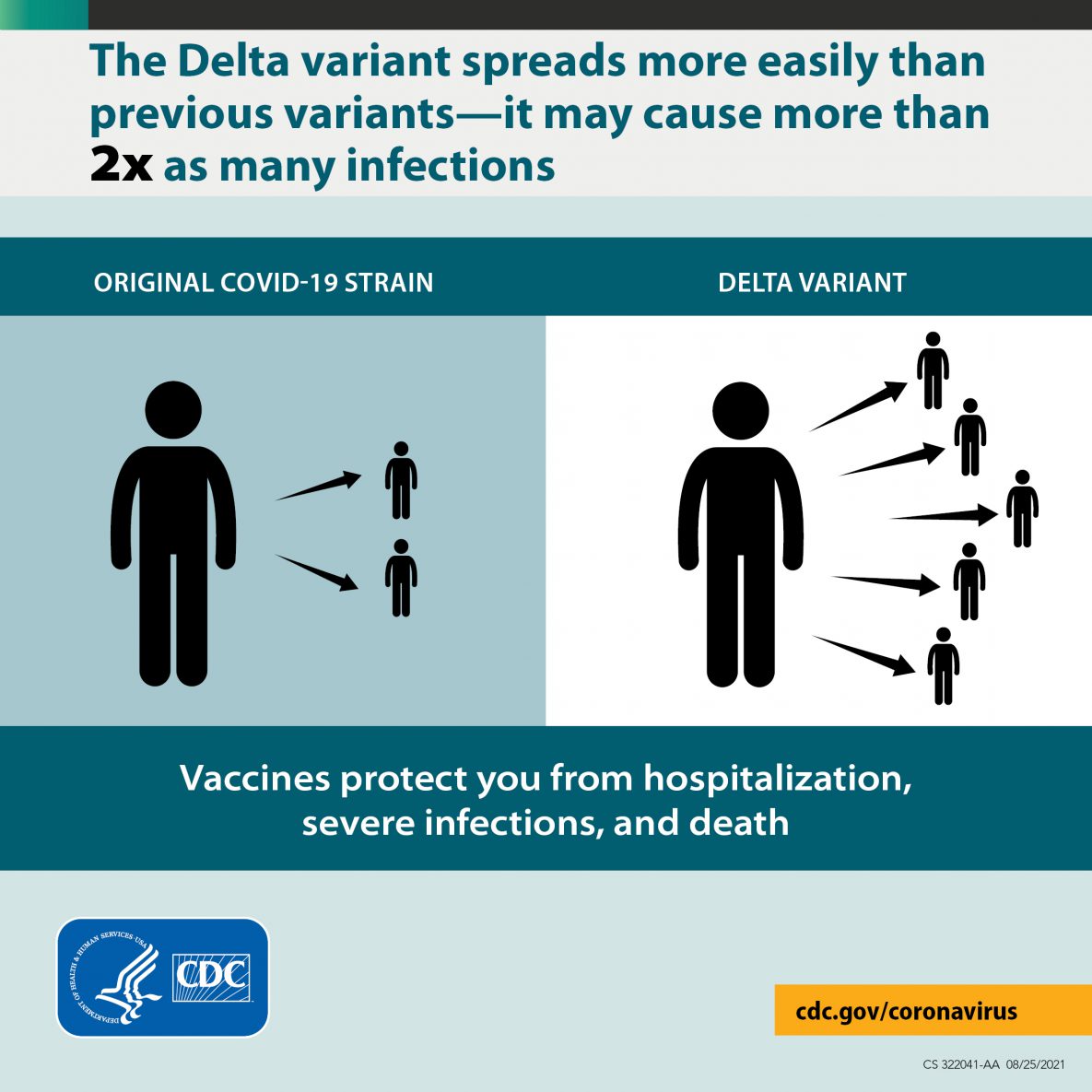El 27 de julio del 2021, los CDC publicaron guías actualizadas sobre la necesidad de aumentar con urgencia la cobertura de vacunación contra el COVID-19 y recomendaron que todas las personas en áreas con transmisión sustancial o alta usen mascarilla en lugares públicos cerrados, incluso si están totalmente vacunadas. Los CDC publicaron esta nueva guía debido a varias situaciones preocupantes y señales que aportan los nuevos datos que van surgiendo.
First, a significant increase in new cases reversed what had been a steady decline since January 2021. In the days leading up to our guidance update, CDC saw a rapid and alarming rise in the COVID-19 case and hospitalization rates around the country.
- In late June, the 7-day moving average of reported cases was around 12,000. El 27 de julio, el promedio móvil de 7 días de casos alcanzó una cifra de más de 60,000. Este índice de casos se parecía más al que habíamos observado antes de que la vacuna estuviera ampliamente disponible.
Second, new data began to emerge that the Delta variant was more infectious and was leading to increased transmissibility when compared with other variants, even in some vaccinated individuals. Esto incluye datos recientemente publicados por los CDC y nuestros socios de salud pública, datos de vigilancia sin publicar que estarán disponibles en las próximas semanas, información incluida en el Informe científico sobre vacunas y vacunación contra el COVID-19 actualizado de los CDC, así como investigaciones de brotes en curso vinculados a la variante delta.
Delta is currently the predominant variant of the virus in the United States. A continuación presentamos un resumen básico de lo que han conocido los científicos de los CDC en el último tiempo sobre la variante delta. Pondremos más información a disposición cuando se publiquen más datos o estén disponibles en otros formatos.
Infecciones y propagación
The Delta variant causes more infections and spreads faster than early forms of SARS-CoV-2, the virus that causes COVID-19
- La variante delta es más contagiosa: la variante delta es altamente contagiosa, casi 2 veces más contagiosa que otras variantes anteriores.
- Some data suggest the Delta variant might cause more severe illness than previous variants in unvaccinated people. In two different studies from Canada and Scotland, patients infected with the Delta variant were more likely to be hospitalized than patients infected with Alpha or the original virus that causes COVID-19. Even so, the vast majority of hospitalization and death caused by COVID-19 are in unvaccinated people.
- Unvaccinated people remain the greatest concern: The greatest risk of transmission is among unvaccinated people who are much more likely to get infected, and therefore transmit the virus. Fully vaccinated people get COVID-19 (known as breakthrough infections) less often than unvaccinated people. People infected with the Delta variant, including fully vaccinated people with symptomatic breakthrough infections, can transmit the virus to others. CDC is continuing to assess data on whether fully vaccinated people with asymptomatic breakthrough infections can transmit the virus.
- Las personas totalmente vacunadas que se infectan por la variante delta pueden propagar el virus a otras personas. However, vaccinated people appear to spread the virus for a shorter time: For prior variants, lower amounts of viral genetic material were found in samples taken from fully vaccinated people who had breakthrough infections than from unvaccinated people with COVID-19. For people infected with the Delta variant, similar amounts of viral genetic material have been found among both unvaccinated and fully vaccinated people. However, like prior variants, the amount of viral genetic material may go down faster in fully vaccinated people when compared to unvaccinated people. This means fully vaccinated people will likely spread the virus for less time than unvaccinated people.
Vacunas
Las vacunas en los Estados Unidos son altamente efectivas, incluso contra la variante delta.
- The COVID-19 vaccines approved or authorized in the United States are highly effective at preventing severe disease and death, including against the Delta variant. But they are not 100 % effective, and some fully vaccinated people will become infected (called a breakthrough infection) and experience illness. For all people, the vaccine provides the best protection against serious illness and death.
- Las vacunas tienen un papel fundamental a la hora de limitar la propagación del virus y minimizar los casos de enfermedad grave. Although vaccines are highly effective, they are not perfect, and there will be vaccine breakthrough infections. Hay millones de estadounidenses vacunados, y la cantidad sigue aumentando. Esto significa que aunque el riesgo de infección en vacunados es bajo, habrá miles de personas totalmente vacunadas que se infectarán y podrán transmitir la infección a otras personas, especialmente con el aumento en la propagación de la variante delta. Low vaccination coverage in many communities is driving the current rapid surge in cases involving the Delta variant, which also increases the chances that even more concerning variants could emerge.
- Vaccination is the best way to protect yourself, your family, and your community. High vaccination coverage will reduce spread of the virus and help prevent new variants from emerging. CDC recommends that everyone aged 12 years and older get vaccinated as soon as possible.
Mascarillas
Given what we know about the Delta variant, vaccine effectiveness, and current vaccine coverage, layered prevention strategies, including wearing masks, are needed to reduce the transmission of this variant
- At this time, as we build the level of vaccination nationwide, we must also use all the prevention strategies available, including masking indoors in public places, to stop transmission and stop the pandemic. Everyone who is able, including fully vaccinated people, should wear masks in public indoor places in areas of transmisión sustancial o alta.
fuente: https://espanol.cdc.gov/coronavirus/2019-ncov/variants/delta-variant.html






